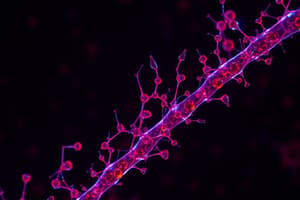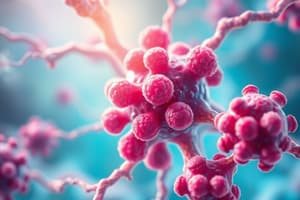Podcast
Questions and Answers
জীবন বিজ্ঞানের কোন বিভাগটি সবচেয়ে ছোট পরিবারিক ও কার্যকারিতা বিশেষ করে অনুসন্ধান করে?
জীবন বিজ্ঞানের কোন বিভাগটি সবচেয়ে ছোট পরিবারিক ও কার্যকারিতা বিশেষ করে অনুসন্ধান করে?
- শক্তি বিজ্ঞান
- ভৌত বিজ্ঞান
- জীবাণু বিজ্ঞান (correct)
- রাসায়নিক বিজ্ঞান
মোলেকুলার বায়োলজির প্রধান উদ্দেশ্য কী?
মোলেকুলার বায়োলজির প্রধান উদ্দেশ্য কী?
- সেল-ভাগ
- রোগের চিকিৎসা
- প্রাণীর অভিবাসন
- নিউক্লিওটাইড গঠন (correct)
প্রাচীন ভৌত বায়োলজির (Ancient Biology) মোাাাোাান্তরিত (Interconnected) উন্নয়নের (Development) (Ancient Biology) 'নি'?
প্রাচীন ভৌত বায়োলজির (Ancient Biology) মোাাাোাান্তরিত (Interconnected) উন্নয়নের (Development) (Ancient Biology) 'নি'?
- Gravity and light
- Planetary motion (correct)
- Atoms and molecules
- Living organisms and their environments
জীবন বিজ্ঞানের পরিভ্রান্তরে, Biology এর পরিভাষা হ'ল
জীবন বিজ্ঞানের পরিভ্রান্তরে, Biology এর পরিভাষা হ'ল
প্রাণীরা এবং তাদের পরিবেশের মধ্যে সম্পর্কগুলি অধ্যয়ন করা হলো কোন বিষয়বস্তুর অন্তর্গত?
প্রাণীরা এবং তাদের পরিবেশের মধ্যে সম্পর্কগুলি অধ্যয়ন করা হলো কোন বিষয়বস্তুর অন্তর্গত?
নিচের মধ্যে কোনটি প্রাণীরা এবং তাদের পরিবেশের মধ্যে সম্পর্কের অনুসন্ধানে সাহায্য করে?
নিচের মধ্যে কোনটি প্রাণীরা এবং তাদের পরিবেশের মধ্যে সম্পর্কের অনুসন্ধানে সাহায্য করে?
নিচের মধ্যে কোনটি Evolution-er অনুসন্ধানের উপর ভিত্তি করে?
নিচের মধ্যে কোনটি Evolution-er অনুসন্ধানের উপর ভিত্তি করে?
Ecology-er অনুসন্ধানের জন্য নীচের মধ্যে কোনটি গুরুত্বপূর্ণ?
Ecology-er অনুসন্ধানের জন্য নীচের মধ্যে কোনটি গুরুত্বপূর্ণ?
Genetics-er অনুসন্ধানের জন্য, Genetics-er উৎপাদন, Genetics-er ।।, Genetics-er ।।, Genetics-er ।।, Genetics-er ।।, Genetics-er ।।, Genetics-er ।।?
Genetics-er অনুসন্ধানের জন্য, Genetics-er উৎপাদন, Genetics-er ।।, Genetics-er ।।, Genetics-er ।।, Genetics-er ।।, Genetics-er ।।, Genetics-er ।।?
Flashcards are hidden until you start studying
Study Notes
Exploring Life Sciences: A Focus on Biology
Life sciences, a multidisciplinary field that encompasses biology, biochemistry, genetics, and other related areas, seeks to understand the fundamental processes of life. In this article, we'll delve into the fascinating world of biology – one of the core subtopics within life sciences.
Biology: The Study of Living Things
Biology is the study of living organisms and their interactions with each other and their environments. Through the lens of biology, we can explore the processes that allow these organisms to grow, develop, reproduce, and adapt. Biology is a vast field with numerous subdisciplines, including cell biology, molecular biology, ecology, and evolution.
Cell Biology
Cell biology is the study of cells, the smallest structural and functional units of life. It focuses on the structure and function of cellular organelles, membranes, and proteins. Cell biology helps us understand cell division, growth, and other essential processes.
Molecular Biology
Molecular biology is the study of the molecules that make up living organisms, such as DNA, RNA, and proteins. It involves understanding the structure, function, and interactions of these molecules. Molecular biology is essential in understanding genetic information and its transmission from one generation to the next.
Ecology
Ecology is the study of the interactions between organisms and their environments, including the distribution of organisms, their population growth, and the processes that maintain ecological balance. Ecology helps us understand how the Earth's ecosystems function and how they can be managed to ensure their continued health and stability.
Evolution
Evolution is the process by which species change over time. The study of evolution helps us understand the origins of life, the relationships between organisms, and the mechanisms of adaptation and speciation. Evolution is a central topic within biology and has profound implications for our understanding of ourselves and the world around us.
Genetics
Genetics is the study of heredity and the variation of traits within and between species. Genetics helps us understand how genetic information is inherited, how mutations arise, and how genetic variation influences the evolution of species.
The Role of Biology in Life Sciences
Biology is a central component of life sciences. Its findings have wide-ranging implications, from understanding the basic workings of living organisms to developing new therapies for human diseases and improving farming practices for better food production. Biology is a continually evolving field, with new discoveries and techniques being developed all the time.
Current Trends in Biology
Some recent trends in biology include:
- Genome editing (CRISPR/Cas9) technology, which allows scientists to precisely modify the genetic information of living organisms.
- The use of microbiomes, which are communities of microorganisms that inhabit different parts of our bodies, to understand human health and disease.
- The development of new imaging techniques, such as super-resolution microscopy, to study cellular processes at unprecedented levels of detail.
In conclusion, biology is a fascinating and essential field within life sciences. Its findings have profound implications for our understanding of living organisms, their interactions, and their place in the world. From the study of cells to the exploration of evolution, biology helps us uncover the mysteries of life and pave the way towards a better future.
Studying That Suits You
Use AI to generate personalized quizzes and flashcards to suit your learning preferences.




